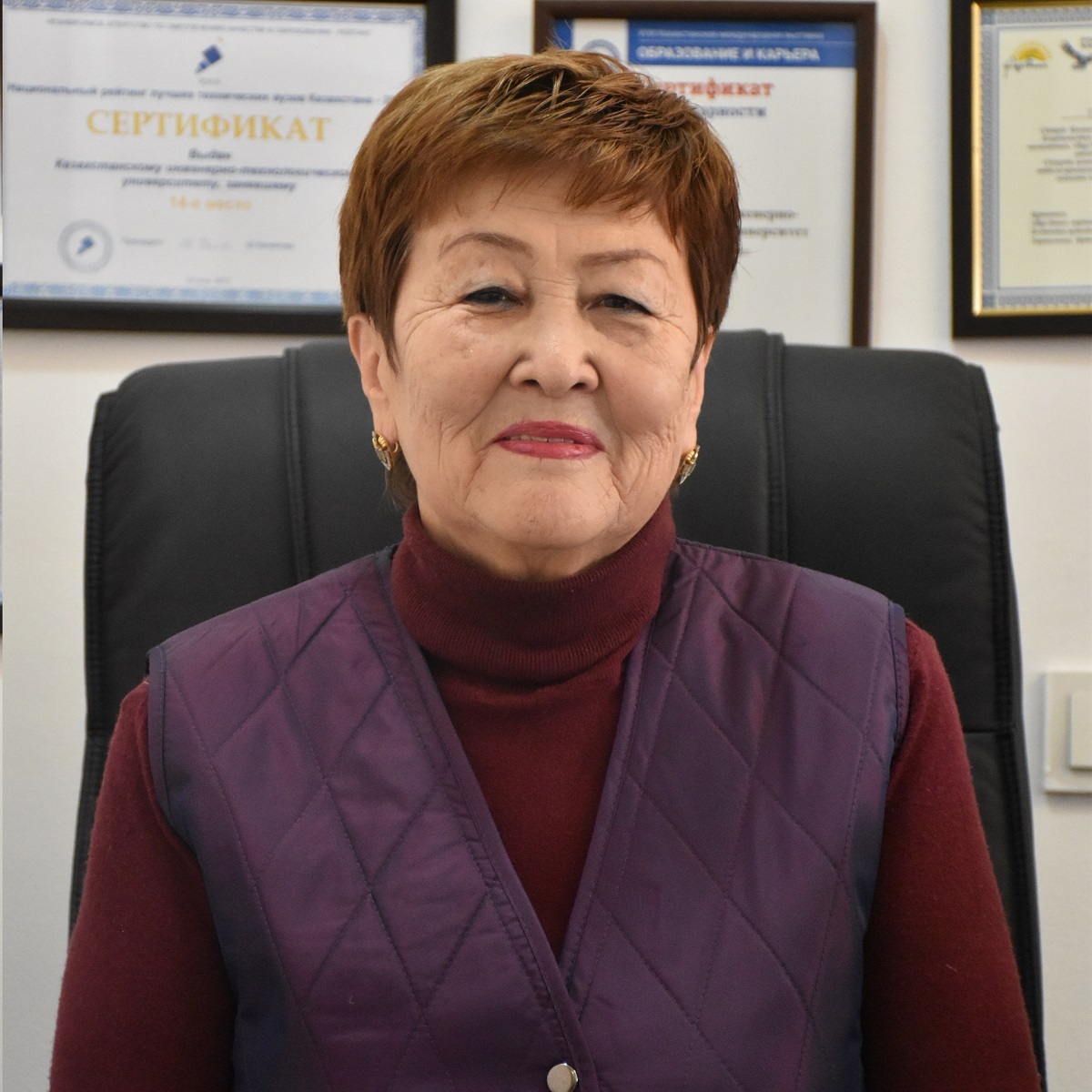
Utegalieva Fazila
Lecturer
The Department of «Biochemical engineering»
email: utegalieva_fazila@mail.ru
A mathematics teacher with 55 years of experience
Kazakh Pedagogical Institute named after ABAI 1967-1972 Assistant of the Department of Higher Mathematics
1972-1975 -postgraduate student of this department
The research topic is incorrect problems of mathematical physics. Scientific supervisor Corresponding member of the Academy of Sciences of the Kazakh SSR Kim E.I.
1975-1985 - Lecturer, Senior lecturer at the Department of Higher Mathematics of the Alma-Ata Institute of National Economy
1985-2004 - Senior lecturer at the Department of Higher Mathematics of the Dzhambul Institute of Technology, then transformed into TARSU
2004-2014 - Senior Lecturer at the Department of Computer Science and Higher Mathematics of Zhambyl University of Humanities and Technology
Since 2014 - Senior lecturer at the Department of Natural Sciences of the Kazakhstan Engineering and Technology University
Since 2022 -Lecturer at the Department of Biochemical Engineering of the International University of Engineering and Technology
1962 - 1967 . .
1972 - 1975 Kazakh Pedagogical Institute named after. Abaya. postgraduate course in specialization: equations of mathematical physics.
The sphere of scientific interests is the didactics of higher education. At the beginning of teaching mathematics to future technological engineers, a set of tasks with elements of professional content will serve to activate their cognitive activity and show professional interest in higher mathematics. This, firstly, shows the universality of mathematical science, and secondly, lays the foundation for subsequent successful learning. When studying the discipline "Mathematics", practical tasks are included in each module, if possible.Students prepare scientific reports in this field.
Publications
textbook "Guide to solving problems in higher mathematics" in collaboration with Keltenova R.K. 1989 MEKTEP Publishing House Textbook "Algebra and geometry" Targu, 2011
Syzyktyk regression tendeuin excel dің komegimen kuru" - "Priority directions for the development of the agro-industrial complex; global challenges and scientific and technical potential" atty Respublika gylymi-praktikalyk zhas galymdar men student conferences Astana - EXPO 2017 -khalykaralyk kormege arnalgan, Almaty, April 06, 2017, .175-178 b.Nazerke Akimzhanovamen birlesken avtolyk
Professional orientation of teaching students of technical universities as a factor in enhancing their cognitive activity REPUBLIC SYNOPSIS BILIM ZHANE GYLYM MINISTRY "ORLEU BAGO" BRANCHES ALMATY BALD BOYINSHA TEACHER KYZMETKERLERDIN BILIKTILIGIN ARTTYRU INSTITUTIONS Bіlim masmunyn zhanartu ayasynda okushylardyn mate tikalyk sauattylygyn damytudyn adistemelik ulgileri . Oh, it's a disembodied material. Almaty, 2017 in collaboration with Temirbekov N.M.
Ekonomikalykˌ - öndírístík zhaġdaylarda matematikalykˌ modelderdíň kˌoldanyluy.Sbornik nauchnykh trudov po materialam mezhdunarodnoy nauchno -prakticheskoy konferentsii «Problemy iperspektivy razvitiya agrarnoy nauki: Vzglyad molodykh» - Almaty, 06 aprelya 2018 g., S.132-134. v soavtorstve s Tleules Yeldana
Economics esepterde tuyndynyn koldanulary.International scientific and practical conference "Integration of education, science and production" in collaboration with AmirkhanovaA
Mathematics education as a factor of success in scientific research in technical industries. International scientific and practical conference "Integration of education, science and production" Almaty, 2021
Article "Sources of grain damage during harvesting" in the collection Proceedings of the International Scientific and Practical Conference: "New Kazakhstan - changing the paradigm of the country's development: high culture and education." - Almaty: KazITU, 2022. 265-272s in co-authorship with Tursbekova G.Zh., Tastemirova B.E.
Article "A new type of threshing accelerator" in the collection Proceedings of the International Scientific and Practical Conference: "New Kazakhstan - changing the paradigm of the country's development: high culture and education." - Almaty: KazITU, 2022. 288-295 pp. in co-authorship with Tursbekova G.Zh., Tastemirova B.E. Article "Onimderdi muzdatkyshtyk saktau adisteri" in the collection Proceedings of the International Scientific and Practical Conference: "New Kazakhstan - changing the paradigm of the country's development: high culture and education." – Almaty: KazITU, 2022. 272-279 pp., in co-authorship with Tursbekova G.Zh., Tastemirova B.E.
The article "Mal soyu orndarynd esengiretu boxyn zharaktau" in the collection Proceedings of the International Scientific and Practical Conference: "New Kazakhstan - changing the paradigm of the country's development: high culture and education." – Almaty: KazITU, 2022. 283-288 p. Tursbekova G.Zh., Tastemirova B.E. The article "Irі kara maldy soyu technologyson zhetildiru adisteri" in the collection Proceedings of the International Scientific and Practical Conference: "New Kazakhstan - changing the paradigm of the country's development: high culture and education." – Almaty: KazITU, 2022. 288-295 pp. in collaboration with Tursbekova G.Zh., Tastemirova B.E.
Textbook "Higher Mathematics. Series", published, Almaty, 2022.